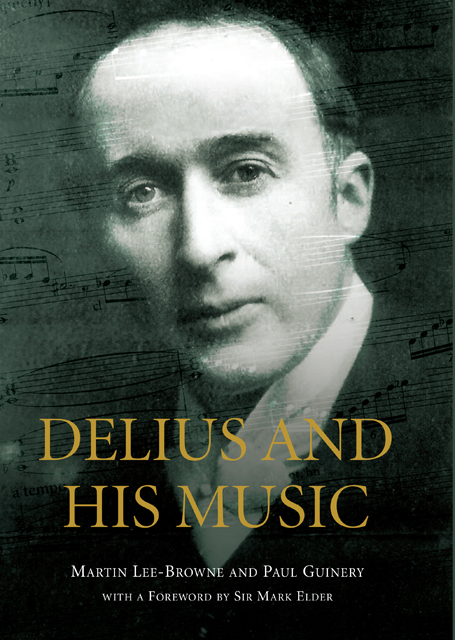Book contents
- Frontmatter
- Contents
- List of Illustrations
- List of Sources and Abbreviations
- Foreword by Sir Mark Elder, CBE
- Preface
- Chapter 1 1862–1888 Youth
- Chapter 2 1888–1892 The Young Composer in Paris
- Chapter 3 1893–1901 Coming to Maturity
- Chapter 4 1902–1905 The Great Noontide and Beecham
- Chapter 5 1906–1910 Acceptance and Friends
- Chapter 6 1911–1914 Inspiration Unabated
- Chapter 7 1915–1918 Winding Down
- Chapter 8 1919–1934 Fenby and the Last Years
- Chapter 9 The Songs
- Chapter 10 1934 and After
- Appendix 1 Delius’s Works in Chronological Order
- Appendix 2 Delius’s Diploma and Reports from The Leipzig Conservatorium
- Appendix 3 Programmes for the 1929 and 1946 Delius Festivals
- Selected Further Reading
- Index
Chapter 2 - 1888–1892 The Young Composer in Paris
Published online by Cambridge University Press: 24 February 2023
- Frontmatter
- Contents
- List of Illustrations
- List of Sources and Abbreviations
- Foreword by Sir Mark Elder, CBE
- Preface
- Chapter 1 1862–1888 Youth
- Chapter 2 1888–1892 The Young Composer in Paris
- Chapter 3 1893–1901 Coming to Maturity
- Chapter 4 1902–1905 The Great Noontide and Beecham
- Chapter 5 1906–1910 Acceptance and Friends
- Chapter 6 1911–1914 Inspiration Unabated
- Chapter 7 1915–1918 Winding Down
- Chapter 8 1919–1934 Fenby and the Last Years
- Chapter 9 The Songs
- Chapter 10 1934 and After
- Appendix 1 Delius’s Works in Chronological Order
- Appendix 2 Delius’s Diploma and Reports from The Leipzig Conservatorium
- Appendix 3 Programmes for the 1929 and 1946 Delius Festivals
- Selected Further Reading
- Index
Summary
In the late 1880s and the 1890s, Second-Empire Paris was an astonishing city, full of contrasts – stunning architecture and appalling slums, great luxury and desperate poverty, an amazing mix of people – and in full artistic, intellectual and musical flow:
The city was abuzz with a thousand scandals, with literary and poetic gatherings of the arguably avant-garde, with eventful dissident exhibitions, soirées liberally sprinkled with cursed, damned or antiestablishment artists, and sophisticated society dinners given by wellknown and admired academe painters. The Exposition Universelle of 1889, which Delius attended … particularly demonstrated the vitality of the vie parisienne and all its spheres of activity in the period of peace and insouciance after the Franco–Prussian War of 1870 … [For the artists in particular, the city was] full of images of the muffled noise of the luxurious salon of an Academy jury member; the hammering of the rain on the meagre and sordid slum of a cubby-hole studio at the end of a narrow courtyard, unpaved and unlit, belonging to a poor débutant artist; in certain quartiers, multi-coloured and international blocks of artists’ flats, near hearty cafés or ill-famed cabarets; brasseries, with their celebrated drinking bouts – and [in many cases] refined decor, thanks to the continuous municipal policy of embellishment, of health improvements and renovation of the quartiers.
In Thomas Beecham’s words:
Prosperity and elegance abounded, and the very air seemed to vibrate with life and excitement. The world of music was dominated by Massenet, Gounod, Franck and Fauré, with Debussy just appearing on the horizon; that of letters by Anatole France, Emile Zola, Paul Verlaine and Guy de Maupassant. Led by Manet, Monet, Renoir and Degas, painting was entering upon the noonday of Impressionism, and around those great personalities were grouped small circles of lesser effulgence and it was to these, rather than to the haunts of musicians, that Frederick was drawn from the first.
Delius arrived in Paris on 6 May 1888, and was welcomed into his uncle Theodor’s apartment in the rue Cambon. A month or so later, he wrote to Grieg:
I have now settled down a bit & must confess that I feel very happy here.
- Type
- Chapter
- Information
- Delius and his Music , pp. 26 - 58Publisher: Boydell & BrewerPrint publication year: 2014



